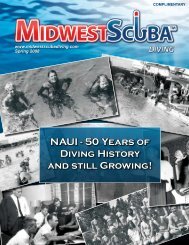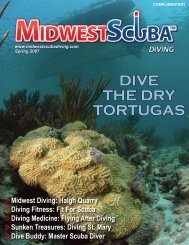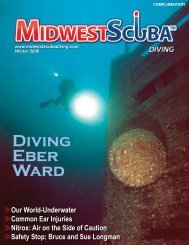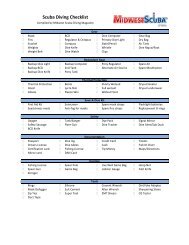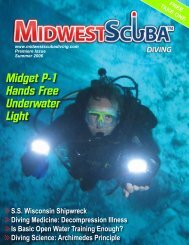great white shark adventure - Midwest Scuba Diving Magazine
great white shark adventure - Midwest Scuba Diving Magazine
great white shark adventure - Midwest Scuba Diving Magazine
You also want an ePaper? Increase the reach of your titles
YUMPU automatically turns print PDFs into web optimized ePapers that Google loves.
Champion Freedivers Speak Out<br />
About Ocean Conservation<br />
By Suzannah Evans<br />
In Europe, the town of Náchod is about as<br />
landlocked as you can get. Nestled in the Sudetes<br />
mountain range in the Czech Republic,<br />
near the Polish border, Náchod doesn’t seem<br />
the likely hometown of a world champion<br />
diver.<br />
By the time he was a small child, however,<br />
Martin Štěpánek had taken to the water. The<br />
son of a competitive swimmer, Štěpánek saw<br />
his first divers at the local pool when he was<br />
seven years old. Impressed by their bulky<br />
equipment, and the way they crawled along<br />
the pool bottom, he knew he wanted to learn<br />
to dive.<br />
Now, at 30, Štěpánek has broken several<br />
world records in freediving, an increasingly<br />
popular sport around the world. Freediving,<br />
or breath hold diving, is exactly what it<br />
sounds like: divers go underwater without<br />
the aid of any breathing equipment, relying<br />
only on their lungs and wits to return them<br />
to the surface. A variety of disciplines have<br />
developed for competition, including diving<br />
using a sled, diving with fins or a monofin,<br />
and swimming for distance with and without<br />
fins.<br />
Štěpánek broke his first world record in 2001<br />
in the discipline known as static apnea, holding<br />
his breath for 8 minutes and 6 seconds.<br />
Since then he’s excelled at diving hundreds<br />
of feet with fins and carrying weight, a type<br />
of competition known as constant ballast.<br />
It was his desire to break the constant ballast<br />
world record that took him to Dahar, Egypt<br />
last summer. There, he would take on his<br />
biggest challenge – and face his <strong>great</strong>est<br />
disappointment.<br />
When he joined the scuba club in Náchod,<br />
Štěpánek was the youngest of the boys. The<br />
others grabbed the government-issued scuba<br />
equipment before he could, and so Štěpánek<br />
often found himself diving sans tank in the<br />
pools, lakes, and quarries the club used for<br />
practice. His favorite sport in the swim club<br />
had been the 50-meter sprint, completed<br />
underwater, and so he had a preternaturally<br />
good breath-holding ability. Soon, this would<br />
grow into the ability to equalize the pressure<br />
in his ears without using his hands to close<br />
his nose, key to diving <strong>great</strong> depths using the<br />
breaststroke.<br />
Keen with interest in nature, he studied<br />
forestry engineering in school. “Probably if<br />
I lived in a country with the ocean, I would<br />
have studied oceanography,” Štěpánek<br />
said. “Forest was the thing that we had at<br />
the time.” He later got a degree in exercise<br />
physiology in Prague. It wasn’t until he broke<br />
the static apnea record that he pursued diving<br />
as a professional career. Now located in Fort<br />
Lauderdale, Štěpánek instructs free diving in<br />
addition to training for competitions.<br />
“I enjoy scuba diving as well, don’t get me<br />
wrong,” Štěpánek said. “I find a lot more<br />
freedom in freediving. To me, it’s the purest<br />
way of connecting with the ocean because<br />
you don’t wear any extra equipment that<br />
separates you from the environment. Therefore<br />
the experience you’re having out of it is<br />
much more pure and more intense.”<br />
That connection with the environment has led<br />
Štěpánek to join the growing conservation<br />
movement. In his travels around the world,<br />
he has noticed a steady decline in marine life.<br />
Even in his local Florida reef, he no longer<br />
sees snapper and grouper.<br />
“The locations that I’ve been diving ten years<br />
ago and diving them now, they’re not the<br />
same,” he said. “There’s so many less fish,<br />
and the coral reef looks totally different. It’s<br />
heartbreaking, literally.”<br />
Štěpánek and Niki Roderick, his student and<br />
diving partner, joined up with Oceana, the<br />
world’s largest international oceans advocacy<br />
group, as they were both gearing up for world<br />
record attempts in Egypt. Štěpánek planned<br />
to set a new constant ballast record, while<br />
Roderick aimed to break the women’s variable<br />
weight record by diving 403 feet while<br />
being pulled feet first by a weighted sled.<br />
From the start, however, their trip to the Red<br />
Sea was plagued. Airport authorities hassled<br />
the teammates over their diving equipment.<br />
Roderick came down with the Egyptian flu,<br />
and windy weather – unusual in the normally<br />
calm Red Sea, which is why it’s a favorite<br />
diving spot – prevented Štěpánek from training<br />
for his world record attempt.<br />
While Štěpánek has trained himself from his<br />
youth to read his body, and to know its limits,<br />
free diving has – not inaccurately – earned<br />
a reputation as a dangerous sport. In 2002,<br />
Audrey Mestre died during a world record attempt.<br />
An investigation concluded that many<br />
factors, including an unusually windy day,<br />
led to her death. And, in early 2007, five-time<br />
world champion Loic Leferme died when a<br />
cable jammed on his ascent from a world-record<br />
dive.<br />
For amateur divers, perhaps the <strong>great</strong>est<br />
danger is shallow water blackout, a loss of<br />
consciousness caused by a lack of oxygen<br />
to the brain. Štěpánek says he doesn’t worry<br />
about the dangers personally.<br />
“If somebody is dumb enough to go out and<br />
free dive by himself, hyperventilates and<br />
stuff like that, yes, it can be dangerous and I<br />
would call it the same as Russian roulette,”<br />
Štěpánek said. “But if you go out there with<br />
someone trained in the proper safety and<br />
under supervision, it’s a pretty safe sport.”<br />
Persistently choppy waters forced Štěpánek’s<br />
team to move to a protected section of the<br />
Red Sea known as the Blue Hole, an old underwater<br />
cave that had lost its ceiling somewhere<br />
along the way. At 300 feet, the Blue<br />
Hole was not deep enough for Roderick’s<br />
world record attempt, so it was scrapped;<br />
Štěpánek had to alter his goal from a constant<br />
ballast with fins record to constant ballast<br />
without fins, a shorter distance to cover.<br />
Incredibly, despite the change in plans and<br />
the switch away from his favored discipline,<br />
Štěpánek bested the world record, 269 feet,<br />
by three feet. When he resurfaced, he was<br />
exhilarated.<br />
“I felt awesome, I felt <strong>great</strong>, because the<br />
whole preparation and the challenges we<br />
ran into, they were physically but also very<br />
psychologically demanding,” he said. “I<br />
felt crushed that I could not do what I came<br />
there to do, and try to do this quick attempt<br />
in something I wasn’t really prepared for.<br />
And actually achieving that at the end and<br />
squeezing every little last piece of oxygen<br />
and energy out of me to complete the dive, it<br />
just felt amazing.”<br />
But the euphoria was not to last. Six weeks<br />
MARTIN STEPANEK AND NIKI RODERICK<br />
later, the International Association for the<br />
Development of Freediving decided not to<br />
recognize Štěpánek’s world record. A judges’<br />
error in recording the event led to its invalidation.<br />
Štěpánek is disappointed, but not defeated.<br />
He still holds the world record in free immersion,<br />
where the diver pulls himself along a<br />
rope during the dive. Next year, he will dive<br />
for the Czech Republic at the world championships,<br />
and take another stab at the constant<br />
ballast with fins record.<br />
What he’d like more than anything is to get<br />
more people in the water, learning the art of<br />
freediving. The intimacy it provides divers<br />
is one way to help preserve the oceans for<br />
future generations – an environmentalist’s<br />
bent that Štěpánek has had since he studied<br />
forestry in the Czech Republic.<br />
“Get people in the water and see what’s happening<br />
– that’s what’s going to make them<br />
think,” he said. “The reason [conservation is]<br />
not happening in the past with our oceans is<br />
that people don’t see it. The fish is far from<br />
them. They only see it in a supermarket. So I<br />
think this would help quite a bit, make people<br />
realize, that it’s the time to do something.”<br />
Snapshot: Suzannah Evans<br />
Suzannah Evans is the editor for<br />
Oceana. She prefers to stay on land.<br />
20 MIDWEST SCUBA DIVING FALL 2007



